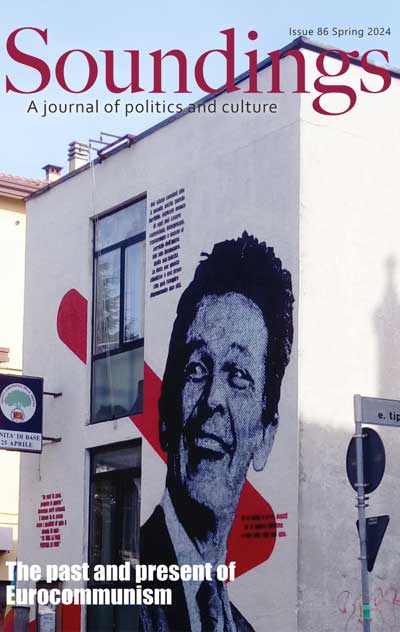
Podemos, Sumar and the return of Eurocommunism: the real, the radical and the populist left
Soundings - Print ISSN 1362-6620 - Online ISSN 1741-0797
Volume 2024 Number 86
Podemos, Sumar and the return of Eurocommunism: the real, the radical and the populist left
Oscar García Agustín pages 20‑38
DOI: 10.3898/SOUN.86.01.2024
Abstract
Given that Eurocommunism was marked by serious limitations in the past, why is it still relevant to think about it? This article argues that Eurocommunism represented an attempt to create and own the necessary political space to advance socialism in liberal democracies, and to search for ways of building a counterhegemonic project within civil society (which would imply cross-class alliances and a subject of change larger than the working class). The approach adopted by the Spanish left in a number of specific moments in its past reflects the difficulties of a project to shape a political space to the left of social democrac y in modern liberal democracies. This is why Eurocommunism continually resurfaces in contemporary left debate and serially reproduces confrontational positions between reformists and ‘real’ leftists or revolutionaries. What began as a preliminary attempt to re-assess the positions of the left during the transition to liberal democracy returned to debate after 2010, at a time when several fractions and political leaderships were competing to define the way to develop left politics. First the Spanish Communist Party (PCE), and then Izquierda Unida (United Left, IU), Podemos and Sumar have been drawn into debates on how to construct a counter-hegemonic project or build a democratic majority; positions on these questions have been a way of defining their parties, an d the basis for splits inside them This article discusses the PCE, IU, Podemos, Unidas Podemos and Sumar in the light of these recurring themes. Eurocommunism typically figures in these battles as a stand-in for reformism. The problem, however, is not these disagreements per se, but an apparent inability to find a way to widen the space of the left to accommodate pluralism. It is difficult to i magine how positions can be consolidated given the perpetual conflicts in the left bl oc. Regardless of whether the goal is democratic socialism, and the subject the people as a whole or the workers, attempts to expand the political space of the left, in a representative and participatory sense, will not be achieved through narrowing the internal space of organisation and debate. The left is more likely to be able to shape its narrative for thinking about the past and dealing with the future by learning from past successes and mistakes. Eurocommunism functions as a reminder of the challenges of forging a left project aiming to govern and become hegemonic. Reproducing the logics that create enemies within the left has not been an efficient strategy for expanding the political space.
To cite this article
Oscar García Agustín (2024) Podemos, Sumar and the return of Eurocommunism: the real, the radical and the populist left, Soundings, 2024(86), 20-38 . https://doi.org/10.3898/SOUN.86.01.2024
